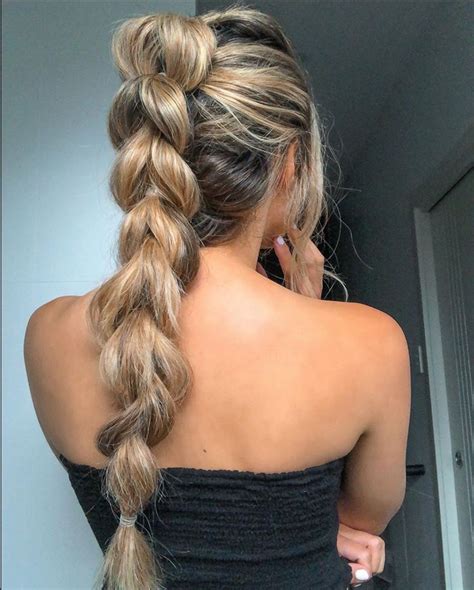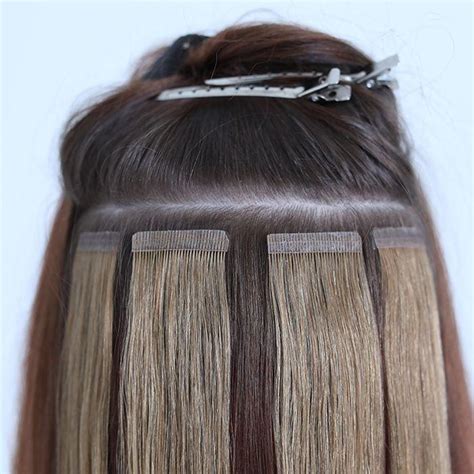Understanding Tape-In Extensions
Tape-in extensions are a type of non-permanent hair extension that utilizes adhesive tape to attach to your natural hair. This method offers numerous benefits, including:

- Quick and Easy Installation: Tape-in extensions can be installed in less than an hour, making them a convenient solution for a quick hair transformation.
- No Damage to Natural Hair: The adhesive tape used in the extensions is gentle on your hair, eliminating concerns about damage.
- Versatile Styling Options: Tape-in extensions can be styled like natural hair, allowing you to create various looks, from sleek and straight to bouncy and voluminous.
- Affordable and Long-Lasting: These extensions offer a cost-effective way to add length, volume, or color to your hair while lasting for up to 6-8 weeks with proper care.
Types of Tape-In Extensions
There are several types of tape-in extensions available, each suited to different hair types and desired results:
- Virgin Hair Extensions: Made from unprocessed human hair, these extensions are soft, silky, and blend seamlessly with your natural hair.
- Remy Hair Extensions: Derived from human hair specifically selected to maintain the hair cuticles in the same direction, Remy extensions offer reduced tangling and matting.
- Synthetic Hair Extensions: These extensions are made from artificial fibers and offer a more affordable option. They come in a wide range of colors and textures.
- Double-Sided Tape Extensions: These extensions feature adhesive tape applied to both sides, making them easy to install and remove.
- Single-Sided Tape Extensions: These extensions have adhesive tape on one side only, requiring you to apply additional tape to the other side during installation.
Tape-In Extension Terminology
To understand the world of tape-in extensions, it’s essential to familiarize yourself with these key terms:
- Weave: The process of sewing hair extensions into your natural hair.
- Tip: The end of a hair extension that is attached to your natural hair.
- Bond: The adhesive used to attach hair extensions to your natural hair.
- Weft: A strip of hair extensions.
- Length: The measurement of hair extensions from root to tip.
- Volume: The amount of hair on a weft of extensions.
Choosing the Right Tape-In Extensions
Selecting the right tape-in extensions depends on several factors:
- Hair Type: Choose extensions that match your hair texture and thickness.
- Desired Length and Volume: Determine the length and volume you want to add to your natural hair.
- Quality: Opt for high-quality extensions made from real human hair or synthetic fibers that mimic the feel of natural hair.
- Brand: Research different brands and read reviews to find reputable manufacturers.
Common Mistakes to Avoid with Tape-In Extensions
- Over-washing: Wash your hair only 2-3 times per week to prevent the adhesive from breaking down.
- Using Hot Styling Tools: Excessive heat can damage both the extensions and your natural hair.
- Sleeping with Wet Hair: Sleeping with wet hair can cause tangling and matting.
- Applying Excessive Hair Products: Styling products can weigh down the extensions and make them look greasy.
- Neglecting Maintenance: Regular touch-ups are crucial for maintaining the quality and longevity of your extensions.
Why Tape-In Extensions Matter
Tape-in extensions offer numerous benefits that enhance your hair and overall appearance:
- Increased Length and Volume: Achieve the long, voluminous hair you’ve always desired.
- Enhanced Confidence: By adding length, volume, or color to your hair, you can boost your confidence and create a more glamorous look.
- Versatile Styling Options: Tape-in extensions allow you to style your hair in countless ways, giving you the freedom to express your unique personality.
- Temporary Transformation: Unlike permanent hair extensions, tape-in extensions can be removed easily, providing you with the flexibility to change your hairstyle whenever you desire.
Benefits of Using Tape-In Extensions
In addition to the benefits mentioned above, tape-in extensions also offer the following advantages:
- No Heat or Chemicals Required: Tape-in extensions are applied without using harsh chemicals or heat, protecting your natural hair from damage.
- Versatility: These extensions can be used for different hair types and textures, including thin, thick, straight, and curly hair.
- Easy Maintenance: Tape-in extensions are relatively easy to care for, requiring minimal maintenance to keep them looking their best.
- Affordable: Compared to other hair extension methods, tape-in extensions are a more cost-effective solution.
Innovative Applications for Tape-In Extensions
Beyond traditional hair extension applications, tape-in extensions can be used in innovative ways to enhance your appearance:
- Adding Bangs: Easily create temporary bangs without having to cut your own hair.
- Highlighting and Lowlighting: Tape-in extensions in lighter or darker shades can be used to add subtle highlights or lowlights to your natural hair.
- Creating a Bob: Transform your long hair into a stylish bob haircut using tape-in extensions.
- Color Blocking: Use tape-in extensions in bold colors to create a playful and experimental look.
Statistics and Market Trends
According to industry research, the market for tape-in extensions is projected to grow significantly over the next five years. Here are some compelling statistics:
- The global market size for hair extensions is estimated to reach $100 billion by 2025.
- Tape-in extensions account for approximately 30% of the global hair extension market.
- The average cost of tape-in extensions ranges from $250 to $500 per installation.
- The demand for tape-in extensions is rising among women of all ages and hair types.
Table 1: Types of Tape-In Extensions
| Type of Extension | Material | Advantages | Disadvantages |
|---|---|---|---|
| Virgin Hair Extensions | Unprocessed human hair | Soft, silky, and blends seamlessly with natural hair | Expensive |
| Remy Hair Extensions | Human hair with cuticles aligned | Reduced tangling and matting | Can be heavy |
| Synthetic Hair Extensions | Artificial fibers | Affordable and available in a wide range of colors and textures | Not as natural-looking as human hair |
| Double-Sided Tape Extensions | Adhesive tape on both sides | Easy to install and remove | Can be bulky |
| Single-Sided Tape Extensions | Adhesive tape on one side only | Requires additional tape during installation | May not be as secure as double-sided tape |
Table 2: Benefits of Tape-In Extensions
| Benefit | Explanation |
|---|---|
| Increased Length and Volume | Adds length and volume to natural hair, creating the desired look |
| Enhanced Confidence | Boosts confidence by enhancing hair appearance and overall beauty |
| Versatile Styling Options | Allows for endless styling possibilities, from sleek to voluminous looks |
| Temporary Transformation | Provides flexibility to change hair styles whenever desired |
Table 3: Common Mistakes to Avoid with Tape-In Extensions
| Mistake | Explanation |
|---|---|
| Over-washing | Washing hair too often can break down the adhesive and shorten the lifespan of the extensions |
| Using Hot Styling Tools | Excessive heat can damage both the extensions and natural hair |
| Sleeping with Wet Hair | Sleeping with wet hair can cause tangling and matting |
| Applying Excessive Hair Products | Overusing styling products can weigh down the extensions and make them look greasy |
| Neglecting Maintenance | Regular touch-ups are essential for maintaining the quality and longevity of the extensions |
Table 4: Innovative Applications for Tape-In Extensions
| Application | Explanation |
|---|---|
| Adding Bangs | Create temporary bangs without committing to cutting your own hair |
| Highlighting and Lowlighting | Add subtle highlights or lowlights to natural hair using colored tape-in extensions |
| Creating a Bob | Transform long hair into a stylish bob haircut using tape-in extensions |
| Color Blocking | Experiment with bold colors by using tape-in extensions to create color blocks |
